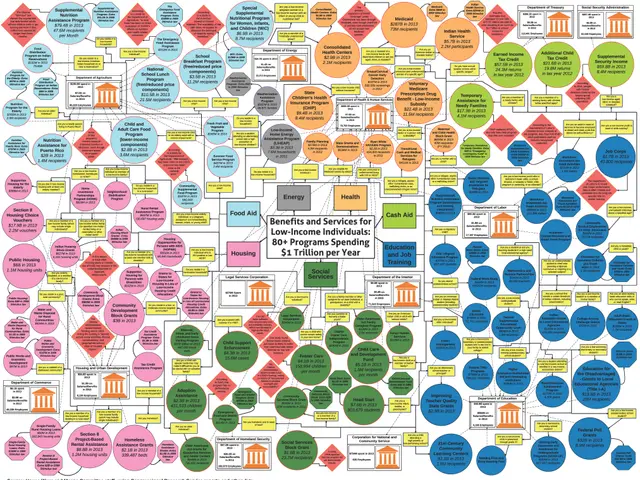Exploring Bitcoin: Witnessing the Influence of "Superior Political Entities" on Finances in 2025
In the late '90s, authors James Dale Davidson and Lord William Rees-Mogg introduced the concept of "mega-politics" in their book, "The Sovereign Individual." They argued that various factors, such as topography, climate, technology, and microbes, influence power dynamics by altering the costs and benefits of exerting power. Among these factors, they identified cryptography as a revolutionary tool set to usher in a new era of sovereignty through "cybermoney."
Fast forward to 2025, and their predictions have come true, albeit in a more tangible form. Bitcoin, a mega-political force, has taken center stage, empowering both individuals and nations to wrestle back control from centralized institutions. This transformation is evident in El Salvador's bold move to adopt bitcoin as legal tender, a move that has drastically altered its economic landscape.
A Nation's Leap to Sovereignty: El Salvador's Story
El Salvador, once plagued by crippling debt, poverty, and corruption, has undergone a remarkable transformation since accepting bitcoin. The country's credit rating has seen a substantial improvement, foreign direct investment has skyrocketed, and major companies have even relocated their headquarters to El Salvador. Tether, a massive $137 billion USD stablecoin ecosystem, is now managed from the country, further cementing its role as a global tech hub.
The influx of profits from Tether's 2024 operations, amounting to roughly 20% of El Salvador's annual GDP, has also attracted other prominent players in the crypto space. The Salvadoran government has taken advantage of this momentum, offering attractive tax incentives under its ICT Innovation Law to cement its reputation as a pro-bitcoin jurisdiction.
Transforming Finance at the Individual Level
Bitcoin is not just reshaping nations; it's also empowering individuals. The once-futuristic idea of escaping financial repression is now a reality for many. People worldwide are leveraging bitcoin to bypass inflation, capital controls, and financial surveillance.
One of the most exciting developments in this area is the rise of home bitcoin mining. Canaan's Avalon Mini 3 and Heatbit's space heaters have made it possible to mine bitcoin while simultaneously heating homes. This dual-purpose approach has made mining accessible to everyday users, democratizing the production of bitcoin and providing individuals with an alternative to relying on centralized exchanges.
Grassroots movements like the Bitaxe Touch are also driving down barriers to entry by sharing blueprints and fostering innovation. By encouraging collaboration and open-source development, these projects are reinforcing bitcoin's decentralized ecosystem and ensuring its long-term resilience and accessibility.
The FDIC's Evolving Role in a Digital Age
Amid these transformative developments, the Federal Deposit Insurance Corporation (FDIC), once tasked with safeguarding depositors and stabilizing the banking system, is struggling to keep up. Allegations of workplace misconduct, including sexual harassment, and its covert involvement in "Operation Choke Point 2.0" – a campaign to deny banking access to bitcoin companies – have raised serious concerns.
Recent accusations suggest that the FDIC not only targeted lawful bitcoin enterprises but also destroyed or withheld documents to cover its tracks. These actions have been met with harsh criticism, with U.S. Senator Cynthia Lummis (R-WY) labeling them as "illegal and unacceptable," reflecting the broader cultural issues within the organization.
As the world moves towards a more digital financial landscape, agencies like the FDIC must adapt or risk becoming obsolete. In the face of mounting public scrutiny of bloated budgets, the FDIC's inaction in fulfilling its mandate is increasingly unacceptable.
The U.S.'s Shifting Policy and Bitcoin's Geopolitical Role
The incoming U.S. administration is emphatically signaling a shift in its stance towards Bitcoin. With Congressman Tom Emmer appointed as Vice Chair of the Digital Assets Subcommittee and possible executive orders supporting Bitcoin innovation, it appears that the U.S. is poised to embrace Bitcoin as a strategic asset.
Advocates for Bitcoin, such as Senator Cynthia Lummis, are pushing for policies that recognize its geopolitical potential. Proposals like the Bitcoin Freedom Act and discussions about Bitcoin-backed tariffs demonstrate a growing recognition of Bitcoin's role in shaping the future of the global economy.
For nations grappling with inflation, debt, and economic uncertainty, Bitcoin represents an opportunity to recapitalize and modernize their financial systems. As we enter this new era of innovation, transparency, and accountability, Bitcoin is poised to play a significant role in shaping the new financial landscape.
Thankfully, our society has progressed beyond the days of 1997, when cryptography was a mere theoretical tool for gaining sovereignty. Today, we can take delight in watching "cybermoney" become a reality before our very eyes.
El Salvador, with its adoption of Bitcoin as legal tender, has attracted attention from other crypto players, such as prominent companies relocating their headquarters and the management of Tether's stablecoin ecosystem. This shift has positioned El Salvador as a global tech hub for cryptocurrencies (El Salvador's story).
The Financial Deposit Insurance Corporation (FDIC), traditionally responsible for safeguarding depositors and stabilizing the banking system, is facing challenges in adapting to the rapid changes brought by cryptocurrencies, with allegations of workplace misconduct and covert involvement in denying banking access to Bitcoin companies (FDIC's evolving role).








